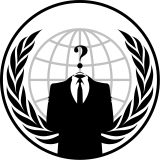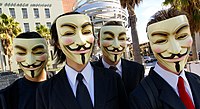 An emblem that is commonly associated with Anonymous. The "man without a head" represents anonymity and leaderless organization.[1] | |
 Individuals appearing in public as Anonymous, wearing Guy Fawkes masks | |
| Formation | c. 2003 |
|---|---|
| Type | |
| Purpose | |
Membership | Decentralized affinity group |
| Part of a series on |
| Computer hacking |
|---|
Anonymous is a decentralized international activist and hacktivist collective and movement primarily known for its various cyberattacks against several governments, government institutions and government agencies, corporations and the Church of Scientology.
Anonymous originated in 2003 on the imageboard 4chan representing the concept of many online and offline community users simultaneously existing as an "anarchic", digitized "global brain" or "hivemind".[2][3][4] Anonymous members (known as anons) can sometimes be distinguished in public by the wearing of Guy Fawkes masks in the style portrayed in the graphic novel and film V for Vendetta.[5] Some anons also opt to mask their voices through voice changers or text-to-speech programs.
Dozens of people have been arrested for involvement in Anonymous cyberattacks in countries including the United States, the United Kingdom, Australia, the Netherlands, South Africa,[6] Spain, India, and Turkey. Evaluations of the group's actions and effectiveness vary widely. Supporters have called the group "freedom fighters"[7] and digital Robin Hoods,[8] while critics have described them as "a cyber lynch-mob"[9] or "cyber terrorists".[10] In 2012, Time called Anonymous one of the "100 most influential people" in the world.[11] Anonymous' media profile diminished by 2018,[12][13] but the group re-emerged in 2020 to support the George Floyd protests and other causes.[14][15]
- ^ "Gabriella Coleman on Anonymous". Brian Lehrer Live. February 9, 2011. Archived from the original on January 28, 2012. Retrieved March 24, 2011 – via Vimeo.
- ^ Landers, Chris (April 2, 2008). "Serious Business: Anonymous Takes On Scientology (and Doesn't Afraid of Anything)". Baltimore City Paper. Archived from the original on June 8, 2008. Retrieved July 3, 2008.
- ^ Oltsik, Jon (December 3, 2013). "Edward Snowden Beyond Data Security". Network World. Archived from the original on April 7, 2014. Retrieved December 4, 2013.
- ^ Winkie, Luke (February 11, 2015). "The Ballad of Rog and Tyrone". The Verge. Archived from the original on August 16, 2021. Retrieved August 16, 2021.
- ^ Waites, Rosie (October 20, 2011). "V for Vendetta masks: Who". BBC News. Archived from the original on May 14, 2020. Retrieved October 20, 2011.
- ^ "EXCLUSIVE: Why Anonymous 'hacked' the SABC, Gupta websites". Archived from the original on October 27, 2019. Retrieved June 19, 2016.
- ^ Krupnick, Matt (August 15, 2011). "Freedom fighters or vandals? No consensus on Anonymous". Oakland Tribune. Archived from the original on August 26, 2016. Retrieved July 10, 2013.
- ^ Carter, Adam (March 15, 2013). "From Anonymous to shuttered websites, the evolution of online protest". CBC News. Archived from the original on May 3, 2013. Retrieved May 6, 2013.
- ^ Coleman, Gabriella (April 6, 2011). "Anonymous: From the Lulz to Collective Action". Archived from the original on May 17, 2013. Retrieved May 5, 2013.
- ^ Rawlinson, Kevin; Peachey, Paul (April 13, 2012). "Hackers step up war on security services". The Independent. Archived from the original on June 29, 2013. Retrieved May 5, 2013.
- ^ Gellman, Barton (April 18, 2012). "The 100 Most Influential People In The World". Time. Archived from the original on April 19, 2012.
- ^ Gilbert, David (November 2, 2016). "Is Anonymous over?". VICE. Archived from the original on July 10, 2019. Retrieved May 17, 2019.
- ^ Griffin, Andrew (August 7, 2018). "Anonymous promises to uncover the truth behind 'QAnon' conspiracy theory". The Independent. Archived from the original on May 7, 2022.
- ^ Griffin, Andrew (June 1, 2020). "'Anonymous' is back and is supporting the Black Lives Matter protests". The Independent. Archived from the original on June 15, 2020. Retrieved June 6, 2020.
- ^ Molloy, David; Tidy, Joe (June 1, 2020). "The return of the Anonymous hacker collective". BBC. Archived from the original on June 1, 2020. Retrieved June 6, 2020.